Here at ThermoWorks, we get lots of questions about using our leave-in-probe thermometers—like Smoke™, ChefAlarm® or DOT®—while grilling. The great thing about leave-in probe thermometers is that they allow you to track changes in temperature over time and can alert you when you get to your target. But is using them when grilling a good idea?
“GRILLING” = HIGH HEAT ENVIRONMENT
Grilling is, by definition, cooking food over the intense heat of an open flame. Because of the intensity of the cooking environment, the internal temperature of grilled foods usually increases rapidly—making it easy to miss your target temperatures and overcook. So using a leave-in probe thermometer (sometimes called a cooking alarm) to track internal temperatures would seem to be a winning idea.
In fact, it can be if you use the right kinds of probes and follow a few safety precautions. Most probes, however, are not cut out for grilling applications.
Grill temperatures can vary, of course, depending upon the fuel and the construction of the grill, but grill surface temperatures are commonly between 400 and 600°F (204 and 315°C). Those are temperatures high enough to burn out probes made by our competitors, but ThermoWorks probes can withstand ambient temperatures up to 700°F (370°C).
THE FLARE-UP: WHERE PROBES GO TO DIE
There is one thing, though, that can easily burn out even ThermoWorks probes: the flare-up.
Flare-ups occur when liquids (fats or oils) are expelled from meats on the grill and drip down onto the fire or coals. Fats act as fuel, propelling an open flame up to the grill surface, and sometimes higher. The temperature of those flames can exceed 1,000°F (538°C), and even armored, high-quality probe cables like those featured in ThermoWorks Pro-Series® Probes max out at 700°F (370°C).
This is why, as a general rule, we don’t recommend using leave-in thermometers for grilling applications. Our leave-in probe thermometers and probes are purpose-built for low-and-slow cooking environments, like ovens and smokers. But even our high-quality, high-temp probes can be burnt out by flare-ups on the grill. So if you’re planning to use a leave-in probe while grilling, you need to take steps to insulate your probes and cables from flare-ups. The probe tip itself should be safely tucked away in the meat or whatever you are measuring, but you still need to be careful with your cables.
HOW TO PROPERLY USE LEAVE-IN PROBES WHILE GRILLING
Remember, even ThermoWorks probe cables are only rated to 700°F (370°C) for Pro-Series Probes. So to help mitigate risk to your probes, here are some steps that careful cooks take to make it possible to use leave-in probes and thermometers like the Smoke, DOT or ChefAlarm while grilling:
- Insert your cooking alarm leave-in probe through the holes and grommets specifically designed for probes on grills rather than closing the cable in the grill lid. This will help keep the cables off the surface of the grill where it can get too hot.
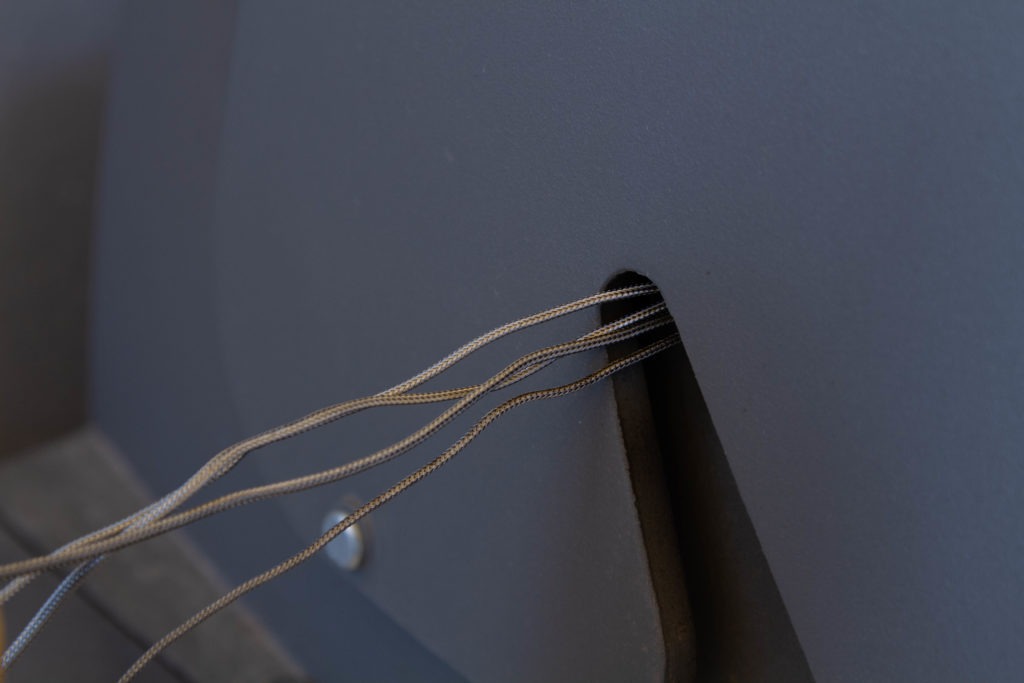
- Insert the probe into food on the grill NEAR the grommet or opening, so that the cable does not need to be draped across the grill grates themselves.
- If necessary, wrap the probe cable and transition with aluminum foil to further reflect the high heat of flare-ups. You can also use a little foil to group multiple probe cables together, directing them toward the grill grommet or opening and away from the grilling surface.
PROBE CONSTRUCTION MAKES A DIFFERENCE
Simply put, ThermoWorks probes are the best probes you can buy for cooking, smoking, and grilling. Our probes are manifestly more accurate, more robust, and longer lasting than the competition. Let’s take a look at ways that ThermoWorks probes are superior to the competition.
- ThermoWorks probes have reinforced transitions. The junctions between the cable and the probe itself and the junction between the cable and the plug are the most likely parts of the probe to fail. ThermoWorks probes feature reinforced heat-resistant transitions and springs around the cables to prevent kinking. The competitors’ probes often feature metal transitions or machine-pressed seals that let the heat in and are more subject to metal fatigue.
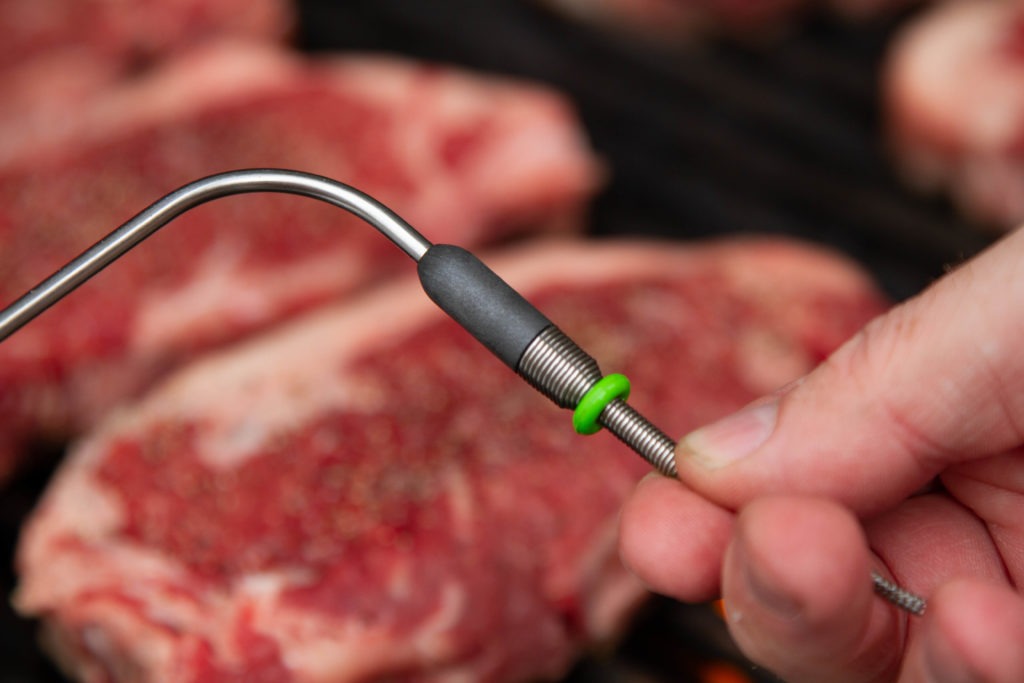
- ThermoWorks probes feature reinforced cables. ThermoWorks probe cables are insulated and reinforced with silicone or metal braiding for great heat resistance and durability.
- ThermoWorks probes are built on more accurate sensors. ThermoWorks thermistor sensors used in our Pro-Series probes are widely known to be the most sensitive and accurate sensors in their class.
- ThermoWorks probes come with published specifications. Good luck finding the maximum-allowable exposure temperatures listed for either the cable or the transition with our competitors’ probes. ThermoWorks publishes complete specs for each of the probes we sell, including…
- Sensor rangeCable max tempTransition max tempWarranty
- Probe and transition dimensions
- Cable length
(We sometimes see owners of our competitors’ products posting on BBQ and cooking forums about buying ThermoWorks probes and plugging them into their non-ThermoWorks meters. But since each brand of thermometer actually calibrates their readout electronics to work with their own brand of probes, their electronics might give false readouts with our probes. We don’t recommend this practice.)
A FINAL NOTE ON GRILLING WITH PROBES
While our probes are designed to be best of class (each batch is tested to make sure they meet our high-quality standards) and are much heartier than those of our competitors, all cooking probes—no matter what type they are, how expensive they are, or who makes them—are subject to decay over time due to the harsh conditions they are used in. Professional BBQ teams always keep extra probes on hand for this reason. Plus, it never hurts to have more types of probes on hand to handle different kinds of cooks!
In the end, it’s important to recognize that there will always be risks when using leave-in probe thermometers while grilling. Flare-up temperatures are too high for probe cables and transitions and can easily burn them out. But the simple steps outlined above, if carefully followed, can help you avoid exposing your probe cables to flare-ups or hot spots and help them stay in good working condition.
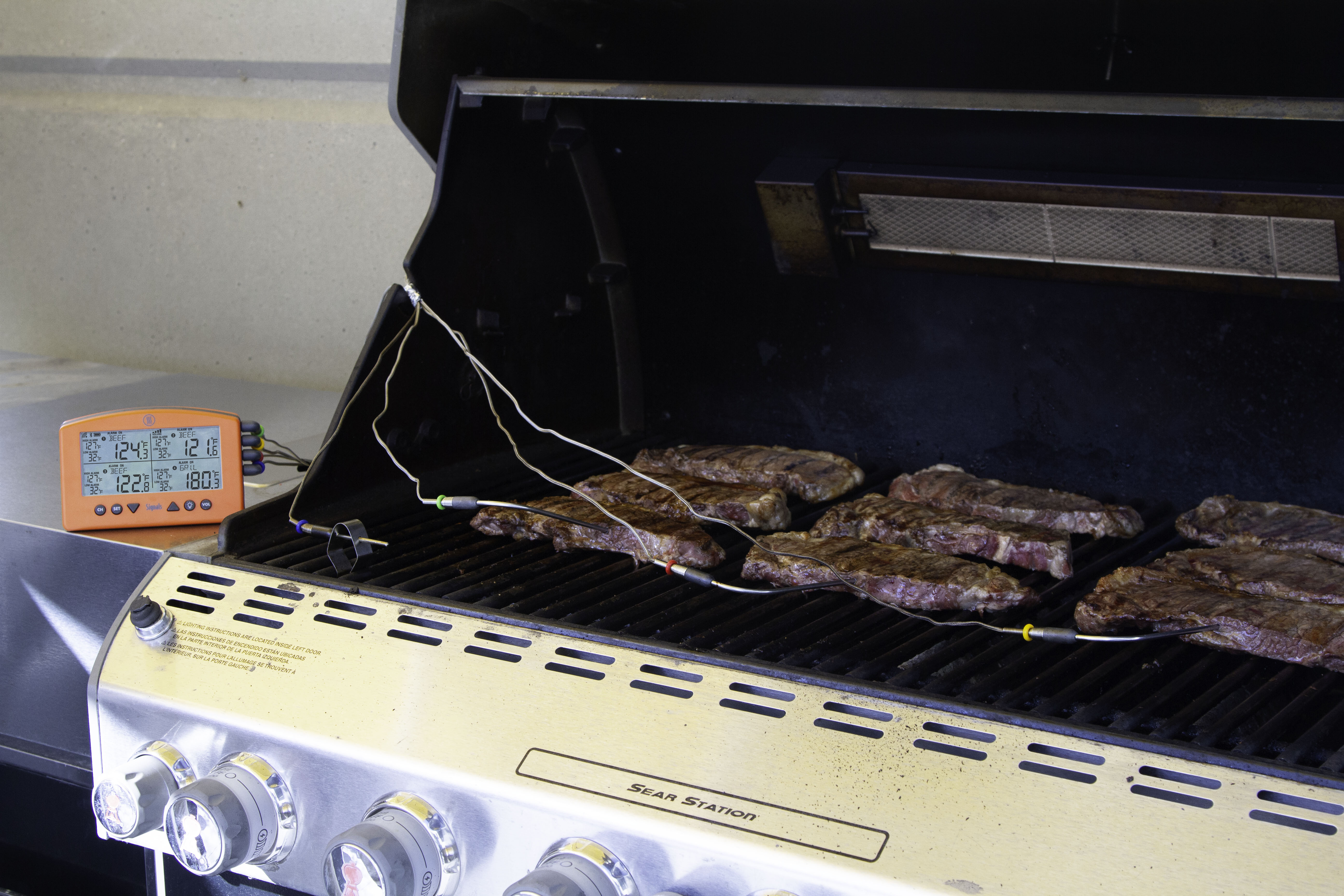
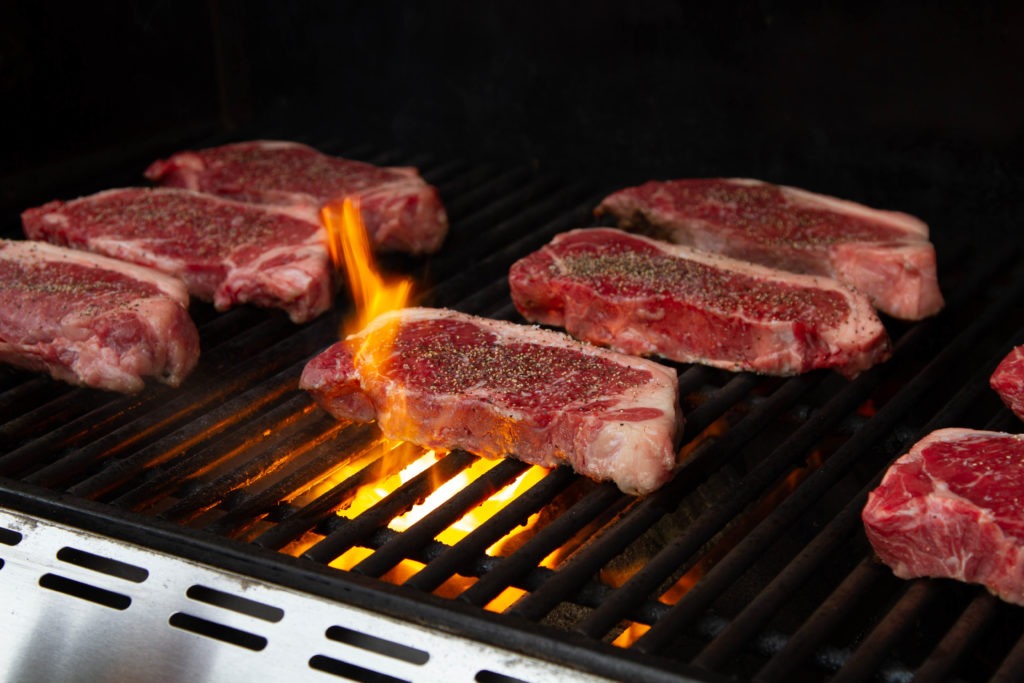

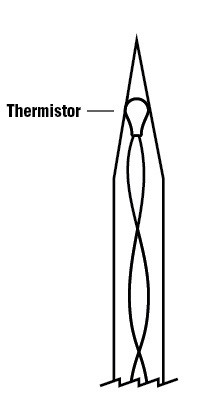


Tom V says
Oooh! When does the “Signals”/4-channel Smoke go on sale? Love it!
Martin says
Tom,
Keep your eyes out for an announcement soon.
Dave Riddle says
The thermometer featured in the pics for this post appear to be a 4 channel Smoke. Am I correct? If so, when do you anticipate it’s release? This is a game changer and something I’m definitely interested in purchasing. Please let me know!
Martin says
Dave,
An announcement is coming soon.
Jack Ramser says
Been cooking long time and had no clue as to how to use. Thanks very interesting.
Robert Sheilds says
Great Article! I am in need of some way to color code both ends of the probe wires. Why? I usually run three to four probes using the Smoke, ChefAlarm and a Dot. It would be nice to know / Remember, which hunk of food is on what device! I noticed in your article that the one probe had a green ring and got excited!
Martin says
Robert,
We’ll have those available very soon so you can keep track of your cooks better!
Ron Crabb says
what unit were you showing that can measure up to 4 probes?
Martin says
Ron,
Signals is coming soon.
Matt says
What is the 4 channel in this ad called I cannot find it??? Would like to purchase
Martin says
Matt,
Keep your eyes open for an announcement soon!
jeffrey otterson says
Exactly what is that four-channel thermometer? I can’t find it on the web site.
Martin says
Jeffrey,
Oh, the Signals? It’s coming soon…
Sam Perkins says
Many grills or smokers don’t have grommets, and for ssmoking it’s important to be able to close the lid. May I suggest that you consider selling a high-temperature-resistant sleeve to fit over the probe cable when smoking meat so that the lid can be closed?
Martin says
Sam,
Interesting idea!
Adam Villhauer says
Is that a Smoke 2.0 with 4 probes and built in WiFi.
Martin says
Adam,
What you see is Signals. I can’t comment on any features, but I can say that the announcement is coming soon.
Tom says
Wht product is in the first picture? It looks like a 4 channel smoke which I’ve not seen before!
Martin says
Tom,
That’s our forthcoming product launch, the Signals! Keep an eye out for an announcement very soon!
Jim says
How far into the meat does the probe need to be to avoid heat conduction from the grill temperature affecting the temperature at the tip of the probe?
Martin says
Jim,
As long as it’s in meat it should be safe. If your meat gets over 700°F, well, it’s toast anyhow.
Frank Arensmann says
Hi!
Is that a 4 channel Smoke in the pictures? I can’t find it anywhere on the sight. Interested/interesting!
Martin says
Frank,
That’s our forthcoming product launch, the Signals! Keep an eye out for an announcement very soon!
Curt says
If a probe or cable does go bad will there be no reading at the meter or will there be an inaccurate reading ? What should I be looking out for ?
Martin says
Curt,
You will get an error reading, not an inaccurate temperature.
Daved says
You end up with “HHH” when the probe is cooled off and plugged in. I just had this happen this weekend. A flare up melted my primary 90 degree probe and it just reads “HHH” when I plug it in. :-/ Definitely something to watch out for.
R. Mueller says
Great info! Thanks.
Scott McClelland says
Is the pictured probe thermometer in this article what I think it is?!?! It looks to be a version of smoke but with four probes and is branded with ThermoWorks logo and the name “Signals” Please please please tell me this is coming out before Christmas because I know what’s at the top of my list now!
Martin says
Scott,
I won’t way when Signals is coming out, but I will say that you should be watching your ThermoWorks emails in the next while.
Paul Mancini says
Hi, I own the Smoke 2-channel Alarm. It came with the Pro-Series® High Temp Cooking Probe, Pro-Series High Temp Air Probe. For deep frying a turkey can either of these probes actually go into the breast and then into the cooking oil while the turkey is cooking? As you know, the peanut oil gets to 350 degrees.
If not, is there another probe to use I can buy that will work with this device?
Thanks
Martin says
Paul,
Sadly you cannot submerge it like that. The issue there isn’t temperature but the oil itself. Oil will work its way into the transitions and start to corrode the insulation and the coatings on the wires.
I would recommend buying a 12″ probe that you can place in the breast while keeping the transitions out of the oil.
John Hunt says
Nice article…but how can I get the 4 channel alarm?
Martin says
John,
You must wait! But not very long…
Dave says
I’m 110% delighted with all my ThermoWorks products. Time Stick, Time Stack, Ir-Gun, Dot, Chef Alarm & Pen.
The products and customer support are the best.
IMO there is no competetion out there.
George H. Middleton says
Hey – thanks for the article. In my experience GrillGrates are an excellent way to prevent flareups while giving perfect grill marks.
Love your products!
Lawrence Wayne says
When will the 4 probe Smoke become available
Martin says
Watch your email soon…
Adriaan says
Were in South africa get one.
Martin says
Adriaan,
You can buy a Signals from our website and we will ship it to South Africa. Unfortunately, we don’t have any distributors there.
David Miles says
Hi,
Is that a 4-channel Smoke in the photos?
David
Martin says
The Signals is coming soon!
KB says
Yup, although it was NOT clear and I used a DOT for grilling and it burned out first time, the company was nice enough to replace the probe. Smartly, they have published this article, and it was probably NOT because I was the only one with “burn-out” issues! Now I don’t know if I want to even TRY to use what I thought was the probe for grilling if I have to cover it with foil and take my chances…
Martin says
KB,
You are not the only one, indeed! Like it says in the article, it really is risky, but it can certainly work. But it is totally a personal decision!
Alva Sallee says
Best recommendation for smoking and remote via receiving or via cell phone..
Alan Collier says
This is all very helpful information. However, it would be great for a design that would withstand temperatures approaching 1000 degrees. Even at a higher cost, these would be a valuable investment.
Dearborn Clark says
What is the temperature measuring unit in the picture above? It has 4 inputs…..something new ????
Martin says
That’s our forthcoming product launch, the Signals! Keep an eye out for an announcement very soon!
Gilles Carrier says
I can’t find this 4 channels ThermoWorks!
Martin says
Gilles,
Look for word on that very soon!
Dave says
Thanks for your informative warning. I hope that Thermo works is developing special protective “sleeves” for cables to withstand potential flare-ups while grilling.
Russ says
Is that a 4 channel Smoke? I can’t find it on the site. When will it be available?
Martin says
Russ,
Keep an eye out for an announcement soon…
Bobby Knell says
The thermometer pictured in your article about probe safety has 4 probes plugged into it. However, I can’t seem to find it on your website. Please advise were I can find that one.
Thanks.
Martin says
Bobby,
That’s our forthcoming product launch, the Signals! Keep an eye out for an announcement very soon!
Sandy McBee says
The orange and yellow thermometers photos, are they on the web site? I could not find them.
Thanks,
Sandy
Martin says
Keep an eye out for an announcement very soon!
Mike Czechowski says
Thanks for this info
on protecting our probes during high heat cooks. What is the best way to clean the CABLE? The probes clean up pretty good with a soapy plastic scrubby but after several low & slow cooks the cables get pretty grungy.
Martin says
Mike,
Indeed they can get grungy! A little degreaser kitchen cleaner (something like 409) works well. Spray some into a cloth and use the cloth to wipe it down. I hope that helps!
Paul says
What is the device that shows 4 probes connected. See picture under your item 2. Didn’t see a comparable device on your website.
Martin says
That’s our forthcoming product launch, the Signals! Keep an eye out for an announcement very soon!
Sheldon says
Bought our “Smoke” unit almost 2 years ago and it still works perfectly. Others we have tried never lasted more than about 6 uses, making the end cost a lot more than the Thermoworks Smoke. Get the best, then you don’t have to worry, and you can sit back and enjoy your food.
Martin says
Sheldon,
Thanks for your comment! You’ve hit the nail on the head with that!
Kenneth L Vermilion says
A couple of outdoor cooking groups I follow on Facebook have, allegedly , scoured your Thermoworks site looking for this specific setup. And claim it’s not on your site. It this gear ready for sale? I ask because I, too, have been a very big fan of your products and, most importantly, the staff!!!
Martin says
Ah! You spotted it! That’s our forthcoming product launch, the Signals! Keep an eye out for an announcement very soon!
Dan Hullings says
I am soooo upset! I just got my Smoke and LOVE it. But now you are making a 4 probe version????? Damn! I should have waited.
Paul Levy says
I have a Kamado Joe and a Chef Alarm. Is it safe to use the probe threaded between top lid and top of the main smoking chamber with the heat deflectors in place? The unit seals with a wire mesh fiberglass gasket. I’m worried about crimping.
Martin says
Paul,
Watch the angle going in, but it should be ok from a crimping standpoint. Just make sure your cable goes over one of the legs of the deflector!
Kevin E says
Got my Smoke + Gateway a few months ago and love it. Hoping this 4 channel is going to be compatible with the Gateway.
Martin says
Kevin,
Actually, the Signals has the wifi built in! It needs no gateway to connect with your phone, and it still uses the same app.
Robert Mitchell says
Will Signals be paired with a 4 channel Gateway?
Martin says
Robert,
Signals doesn’t need a gateway to pair! It has native Bluetooth and Wifi built in, so no additional equipment is necessary.
Allan Friedland says
Nice article. My Smoke probe connects to smoke and the display frequently goes to – – – until I twist it around in socket until temp display comes back on. Is this typical of a fritzed out probe???
Martin says
Allan,
You might want to give our experts in our Tech Support department a call. Call ThermoWorks at 800-393-6434 and ask for tech support. They will know how to tell what’s up!
Barry Giller says
Other than tin foil is there any other sleeve product that can be used to protect cable probes.
Martin says
Anything flame/fire proof should work, but I’m having a hard time thinking of something!
Nathan says
I smoked a tomahawk last night with new Signals. The unit said it was 136F. But when I cut it open it was still raw. What did I do wrong?
Martin says
It’s probable that the part of the steak the probe was in was at 136°F but that the tip of the probe was not in the thermal center of the steak. That’s why we encourage confirming internal temperatures with and instant-read thermometer. Even after all the steak cookery I’ve done, I still get surprised by doneness from time to time—the probe placement matters a LOT.